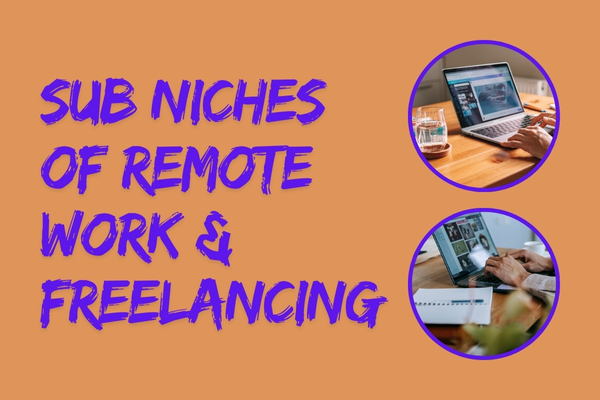Table of Contents
Remote Work & Freelancing are no longer just a trend—it’s a global shift that has redefined the way we earn, collaborate, and live. Whether you’re just starting out or you’re exploring new ways to earn a living from anywhere in the world, understanding the various sub-niches of Remote Work & Freelancing can help you find the path that’s right for your skills and goals. In this post, I’ll walk you through some of the most promising sub-niches, debunk common myths, answer frequently asked questions, and share practical tips based on real-world research and experience.
What is Freelancing and Remote Work?

Before we get into the sub niches of Remote Work & Freelancing, let’s clarify what we mean by these terms.
Freelancing is when you work independently, offering services to clients on a contract or project basis. You’re essentially your own boss, and you can work with clients globally.
Remote work, on the other hand, refers to working from a location outside of a traditional office, often from home or while traveling. Most freelancers work remotely, but not all remote workers are freelancers. Some are full-time employees who simply work off-site.
Together, Remote Work & Freelancing offer unmatched flexibility, control, and opportunity. According to Upwork’s Freelance Forward report, over 60 million Americans freelanced in 2022, contributing $1.35 trillion to the economy.
Main Categories & Sub Niches in Remote Work & Freelancing

After researching popular platforms like Fiverr, Upwork, Freelancer, and checking trends from LinkedIn Jobs and Indeed, here are some of the most in-demand sub-niches in Remote Work & Freelancing:
💡 Tech & Development
- Web Development: Frontend (HTML, CSS, React) and Backend (Node.js, PHP)
- App Development: Android, iOS, Flutter, and cross-platform apps
- Shopify & WordPress Development
- Web3 & Blockchain Development
- DevOps and Cloud Services
🎨 Design & Creative
- Graphic Design
- UI/UX Design
- Logo and Branding
- Video Editing
- Motion Graphics & Animation
✍️ Writing & Content Creation
- Blog Writing & SEO Articles
- Technical Writing
- Copywriting
- Ghostwriting
- Ebook Writing
📊 Digital Marketing & Sales
- Social Media Management
- Email Marketing
- PPC Campaign Management (Google Ads, Meta Ads)
- Affiliate Marketing
- Sales Funnels & CRM Setup
📊 Business & Admin Support
- Virtual Assistance
- Data Entry
- Customer Support
- Online Bookkeeping
- Project Management (Agile, Scrum)
🧑🏫 Coaching, Consulting & Education
- Online Tutoring (Academic, Skill-based)
- Career Coaching
- Business Consulting
- Course Creation
- Educational Content Development
🛒 eCommerce Services
- Amazon VA
- Shopify Store Setup & Maintenance
- Product Research & Listing Optimization
- Dropshipping Management
🔊 Other Specialized Niches
- Voiceover Services
- Translation
- Podcast Editing
- Legal Consulting
- HR & Recruitment Services
How to Choose the Right Sub-Niche
When you’re navigating Remote Work & Freelancing, it can feel overwhelming. Here’s what helped me, and what I advise anyone looking to specialize:
- Assess your skills: What are you good at? Do you already have experience in a field?
- Research market demand: Platforms like Upwork and Fiverr can give you real-time insight.
- Passion vs Profit: Find a balance between what you love and what pays well.
- Start narrow, then expand: Focus on one skill at a time and grow your service offerings gradually.
Myths vs Facts About Remote Work & Freelancing

Myth: Freelancing is not stable.
Fact: With recurring clients, consistent marketing, and diversified services, you can create a very stable income.
Myth: Remote Work means working from a beach with a laptop.
Fact: It still requires discipline, planning, and structured working hours.
Myth: Only tech professionals can freelance remotely.
Fact: Virtual assistance, writing, tutoring, and admin services are equally in demand.
Myth: Clients won’t hire beginners.
Fact: Everyone starts somewhere. Building a strong portfolio and getting your first review is key.
FAQs About Remote Work & Freelancing

What are the best freelancing platforms to start on?
Upwork, Fiverr, Freelancer, and PeoplePerHour are great for beginners and experienced professionals alike.
Do I need a degree to start freelancing?
No. Skills, a strong portfolio, and communication matter more than formal education.
How can I get my first client?
Start by offering competitive pricing, personalizing your proposals, and delivering more than expected.
Can I freelance while working a full-time job?
Yes, many successful freelancers started part-time. Just manage your time well.
Which freelance niche is best for beginners?
Virtual assistance, blog writing, social media management, and graphic design are great entry points.
Conclusion
Exploring the sub niches of Remote Work & Freelancing can open up exciting career opportunities no matter your background or skill level. The freelance economy is growing, and there’s room for everyone willing to learn, adapt, and deliver real value.
If you’re serious about starting your freelancing journey or want to specialize in a particular area of Remote Work & Freelancing, I recommend visiting our blog page. We also write helpful blog posts on health and wellness and WordPress tutorials to support your personal and professional growth.





Преимущества мостовидных несъемных зубных протезов.
Мостовидные протезы на жевательные зубы [url=https://belfamilydent.ru/services/mostovidnoe-protezirovanie/]Мостовидные протезы на жевательные зубы[/url] .